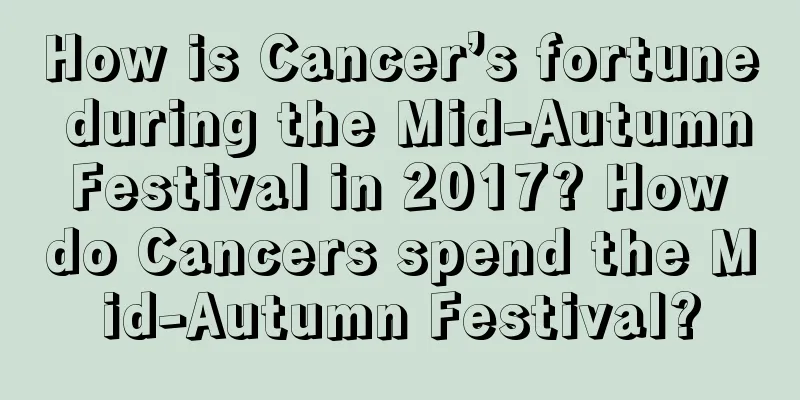Is the Double Ninth Festival a legal holiday? What are the customs of the Double Ninth Festival?

Introduction: The Double Ninth Festival is an important traditional festival. So is it a legal holiday? What are the customs of the Double Ninth Festival? Follow the editor to find out. Mr. Shui Mo has carefully compiled detailed information about the ninth month of the lunar calendar in 2018. If you want to know the auspicious and inauspicious days in the ninth month of the lunar calendar, please go to Mr. Shui Mo.Is Double Ninth Festival a legal holiday?The Double Ninth Festival in 2018 is on October 17, a Wednesday.The Double Ninth Festival is not a legal holiday, so there is no holiday! The Double Ninth Festival (also known as: Senior Citizens' Day) is a traditional festival of the Han ethnic group and is held on the ninth day of the ninth lunar month every year. Because "six" is defined as a yin number and "nine" as a yang number in the Book of Changes, the sun and the moon are both yang on September 9, and two nines overlap, hence the name Double Ninth Festival, also known as Double Nine. The Double Ninth Festival was formed as early as the Warring States Period. In the Tang Dynasty, it was officially designated as a folk festival and has been passed down from dynasty to dynasty since then. People have the custom of climbing heights on this day, so the Double Ninth Festival is also called the "Climbing Heights Festival." What are the customs of Double Ninth Festival?Climbing heights <br /> In ancient times, people had the custom of climbing heights on the Double Ninth Festival, so the Double Ninth Festival is also called the "Climbing Heights Festival." According to legend, this custom began in the Eastern Han Dynasty. There are many poems about climbing mountains written by literati in the Tang Dynasty, most of which describe the customs of the Double Ninth Festival. Du Fu's seven-character poem "Climbing Mountain" is a famous poem about climbing mountain on the Double Ninth Festival. There is no uniform rule on where to climb, but it usually means climbing mountains or towers. There is also the custom of eating "Chongyang Cake".Eating Chongyang Cake <br /> According to historical records, Chongyang Cake is also called flower cake, chrysanthemum cake, and five-color cake. There is no fixed method for making it, so it is quite casual. At dawn on September 9th, people would place a piece of cake on their children’s foreheads and chant something, wishing their children success in everything. This was the original intention of the ancients making cakes in September. The elaborate Double Ninth Festival cake is made into nine layers, like a pagoda, with two lambs made on top to match the meaning of Double Ninth Festival (sheep). Some people even put a small red paper flag on the Chongyang cake and light candles. This probably means using "lighting lamps" and "eating cakes" instead of "climbing high", and using small red paper flags instead of dogwood. There is still no fixed variety of Chongyang cake today. The soft cakes eaten on Chongyang Festival in various places are all called Chongyang cake. Appreciating chrysanthemums and drinking chrysanthemum wine <br /> The Double Ninth Festival is the golden autumn season of the year, when chrysanthemums are in full bloom. It is said that appreciating chrysanthemums and drinking chrysanthemum wine originated from the great poet Tao Yuanming of the Jin Dynasty. Tao Yuanming was famous for his seclusion, his poetry, his wine, and his love of chrysanthemums; later generations followed his example, and thus the custom of appreciating chrysanthemums on the Double Ninth Festival came into being. In the old days, scholars and literati combined chrysanthemum appreciation with banquets in order to get closer to Tao Yuanming. In Kaifeng, the capital of the Northern Song Dynasty, the custom of appreciating chrysanthemums on the Double Ninth Festival was popular. At that time, there were many varieties of chrysanthemums with various shapes and appearances. People also call the ninth month of the lunar calendar the "Chrysanthemum Month". During the Double Ninth Festival, when chrysanthemums bloom proudly in the frost, viewing chrysanthemums has become an important part of the festival. After the Qing Dynasty, the custom of chrysanthemum appreciation became particularly prosperous. And not limited to September 9, but it is still most prosperous around the Double Ninth Festival. Inserting dogwood and wearing chrysanthemums <br /> The custom of inserting dogwood on Double Ninth Festival was already very common in the Tang Dynasty. The ancients believed that wearing dogwood on the Double Ninth Festival could ward off disasters and misfortunes; some people wore it on their arms, made a sachet and put the dogwood inside and wore it, or wore it on their heads. Most of them are worn by women and children, and in some places, men also wear them. Wearing dogwood on the Double Ninth Festival was recorded in Ge Hong's "Miscellaneous Notes on the Western Classics" in the Jin Dynasty. In addition to wearing dogwood, people also wear chrysanthemums on their heads. This has been the case since the Tang Dynasty and has been popular throughout the ages. During the Qing Dynasty, the custom of the Double Ninth Festival in Beijing was to stick chrysanthemum branches and leaves on doors and windows to "eliminate evil and attract good luck." This is a change in the custom of wearing chrysanthemums on the head. In the Song Dynasty, people also cut colorful silk into dogwood and chrysanthemums to give to each other as gifts or wear. Flying kites <br /> Flying kites is a major custom during the Double Ninth Festival in Huizhou. In other words, the main feature of the Double Ninth Festival in Huizhou is flying kites. This custom is not only described in folk songs circulating in Huizhou, but also recorded in the "Huizhou Prefecture Chronicle" of the Guangxu period. Kites are also known as kites today. The word "kite" is the name used after the Five Dynasties. Before that, people in the north used to call it "paper kite", while people in the south mostly called it "kite". The name "paper kite" in Huizhou obviously retains the ancient name before the Five Dynasties, and has a "mixed" flavor of the north and the south. |
<<: Is the first day of September in the lunar calendar in 2018 a suitable date for funerals?
Recommend
Is the fate and fortune of people born in the year of Jingzhe in 2018 good?
Spring is a season of blooming flowers, bidding fa...
In which direction will the God of Happiness be on the Grain Rain Day in 2022?
Grain Rain is one of the solar terms that reflects...
Is it a good thing to have a girl born on November 28th of the lunar calendar in 2017? What is the lunar calendar date?
In life, the thing that parents are most concerned...
Which plant is the most suitable gift for New Year's greetings in 2017?
Introduction: Before the Chinese New Year, many fl...
Is the second day of the twelfth lunar month in 2017 suitable for funerals?
Introduction: Birth, aging, sickness and death are...
Is it appropriate to sign a contract on September 17th of the lunar calendar in 2017? What are the do’s and don’ts?
Every day has good and bad days, and the fortune a...
Where is the direction of the God of Happiness on February 5, 2020, the 24th day of the 12th lunar month?
Where is the direction of the God of Happiness on...
Can I pick up the car on February 20th of the lunar calendar in 2020? Are there any Feng Shui considerations?
When picking up a car, you need to pay attention ...
Is the 29th day of the fifth lunar month in 2018 a suitable day for funerals?
The lunar calendar is a traditional Chinese cultur...
Is the 23rd day of the twelfth lunar month in 2020 the Little New Year? What is the meaning of the Little New Year?
Introduction; It is the twelfth month of the year ...
Is July 1, 2019, the Party Founding Day, a suitable date for burial? Is today an auspicious day for burial?
Introduction: Burial is also an important matter, ...
Is June 1, 2019, Children's Day, an auspicious day for a funeral? Is it auspicious to hold a funeral today?
Introduction: Funeral is also a major event, so an...
What should I pay attention to on moving day? Can Xiaoxue move to a new home in 2020?
What should I pay attention to on moving day? Can ...
Can’t go out on the night of Double Ninth Festival? What can and cannot be done on Double Ninth Festival in 2020?
The ninth day of the ninth month of the Chinese lu...
Is the 23rd day of the sixth lunar month in 2017 a suitable day to start construction and renovate a house?
Introduction: Decoration is a major project for ma...









